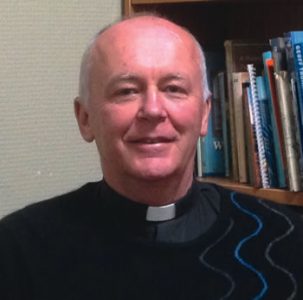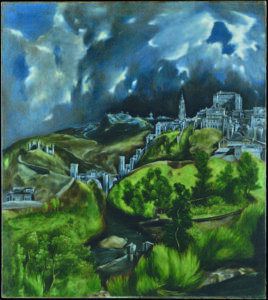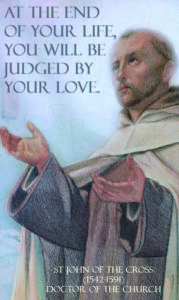St John of the Cross — The Spiritual Canticle
Part 2 of 5
St John of the Cross, the Mystical Doctor of the Church, provides teaching to help us survive and thrive in these testing times. To begin to appreciate his profound wisdom, a wise man told me to begin with the Spiritual Canticle. Professor E Allison Peers calls it one of the loveliest poems the human heart has ever conceived and believes that nowhere outside Scripture is such knowledge of love expressed with greater depth and eloquence.
St John of the Cross’s other works -- Ascent and Dark Night, for example – help people reach the goal of love for Christ and outline what we must give up to attain Christ. Sometimes, people begin reading the Dark Night and find it so negative that they give up reading. Hence, we begin here with the goal -- union with God -- and later we will discuss the means to attain this.
The Spiritual Canticle is a love poem which was written mostly in 1577-1578 in prison in Toledo, Spain. In that hellish experience, God spoke to the heart of St John and he composed thirty-one of the forty verses of this poem. In the years following, he completed the other nine stanzas and added a commentary for each stanza.
It is said that when they heard the Spiritual Canticle, people learnt it off by heart. Madre Ana de Jesus begged St John to explain the poem more, so he composed a commentary, mainly explaining the symbols used in the poem.
His earlier studies of Scripture, especially of the Song of Songs -- its images, scenes and words -- and his experience as a spiritual director, were the basis for his long-awaited commentary begun in 1578 and finished in 1584.
The Spiritual Canticle is considered to be less dense and more poetic than his other major works. There are two editions – Canticle A and Canticle B, with differing sequence and numbering of the stanzas from the revisions made by St John himself.
The commentary on each stanza has four main elements:
i] a general summary
ii] a detailed explanation of each verse
iii] doctrinal clarification and theological justification for the teaching
iv] In Canticle B there are themes and introductions not found in Canticle A as St John, loving and careful pastor of souls, sought to make it clearer.
The Spiritual Canticle begins,
Where have you hidden, Beloved, and left me moaning?
You fled like the stag after wounding me;
I went out calling you, but you were gone.
The major theme of the Canticle is the love of God for the soul and the soul seeking to return this love. It is bridal mysticism. The soul is lovesick. The poem is a love song between the Beloved and the soul. So, as with reading any poem, use your imagination and your intellect. St John was in love and his love poetry must be read through that lens -- not that he claims the poetry or commentary can convey fully the experience of God’s love.
It has three main sections:
1] Stanzas 1-12 -- the Search for the Beloved; first steps in the journey -- longing for Beloved
2] Stanzas13-21 -- preparations for Perfect Union, urgent desires for complete freedom; spiritual betrothal
3] Stanzas 22-40 -- Full Union, spiritual marriage -- mutual surrender
Section 1
The soul anxiously searches for her beloved. It is a hurried searching. She looks in the mountains, the watersides, but is not satisfied. In fact, in the search, she becomes more wounded. What little true knowledge it has of God wounds it to death [stanza 8].
In stanza 3, St John writes, Since seeking God demands a heart naked, strong and free from all evils and goods that are not purely God, the soul speaks in this and the following verses of the freedom and fortitude one should possess in looking for him.
It is true that the soul has to give up much -- everything! -- but St John is also very aware of the beauty of creation. Even creation’s beauty is not sufficient to satisfy the soul’s longing for God himself. So, the trials and bitterness and mortifications are all accepted as a means to this union with God. The soul accepts the pains and straits of love. St John describes these early periods of searching for God with the touch of a spiritual expert.
The soul catches sight of him at last. The vineyard is in flower. The tone of the poem changes. The soul is more at rest and is tranquil. It enjoys the flowery bed, the cellar of spiced wine and balsam. God is to the soul like the mountains, lonely wooded valleys, strange islands, silent music, the tranquil night. But the soul is not wholly free. There are still disturbances -- the foxes, dead north wind, lions, stags, fears of night -- all of these unsettle the communion of love.
For example, in stanza18 St John writes, by the lions, he refers here to the appetites and rebellions of this tyrant king, sensuality. It is the time of spiritual betrothal, engagement, but not yet marriage. The soul is like a great lord shut up in prison, possessing untold wealth which she is by no means able to enjoy as she would.
So, the soul must not only be cleansed and purified of all imperfections and rebellions but must also receive a new strength and most sublime love to bear the strong, close embrace of God.
Section 3
The spiritual marriage takes place. The highest summit of perfection in this life is reached. The soul has possession of the delight, peace and sweetness of union. Nearly half of the Spiritual Canticle is taken up with describing the indescribable joy of this marriage: reclining on the gentle arms of the Beloved.
As he writes, beneath the apple tree there was thou betrothed to me. There I gave thee my hand and thou was redeemed in the place where thy mother (Eve) was violated. The triumphant Second Adam has restored our souls. Now there are no intruders. Here, there is no absence. Wedded to Christ, the soul is at perfect peace. Yet St John still points us to the fullness of love still to come in the beatific vision. In stanza 38, he writes, in the two preceding stanzas the bride’s song focussed on the good the Bridegroom will offer her in that eternal bliss. As the poem says, there you will show me what my soul has been seeking.
Finally, in stanza 29, St John writes, without prayer they would do a great deal of hammering but accomplish little and sometimes nothing, and even, at times, cause harm. He lived in the real world!
Also, he writes in stanza 39, O souls, created for these grandeurs and called to them! What are you doing? How are you spending your time? Your aims are base and your possessions miseries! O wretched blindness of your eyes! You are blind to so brilliant a light and deaf to such loud voices…
St John of the Cross, pray for us!



 Entries(RSS)
Entries(RSS)